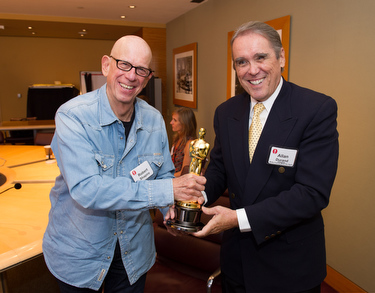St. Martinville lawyer wins Oscar
Published 2:00 pm Wednesday, December 26, 2012

- Bob Shapiro, former president of Warner Bros., presents St. Martinville native Allan Durand with an Oscar for the Academy Nicholl Fellowship in Screenwriting.
ST. MARTINVILLE — St. Martinville native and city attorney Allan Durand was selected for the 2012 Academy Nicholl Fellowship in Screenwriting for a script based on a true story in his hometown.
The five winners selected, including Durand, received a $35,000 prize, which was distributed at a gala dinner in Beverly Hills, Calif., on Nov. 8.
Durand’s screenplay “Willie Francis Must Die Again” was selected from 7,197 scripts that were submitted for this year’s competition, and he was the first person from Louisiana to ever receive the award, according to a statement from the Academy of Motion Picture Arts and Sciences.
Since the program’s inception in 1985, 123 fellowships have been awarded.
Past recipients include Rebecca Sonnenshine, the executive story editor for the WB series “The Vampire Diaries,” Andrew Marlowe, creator and executive producer for the ABC series “Castle” and writers for box office hits “Children of Men,” “Twilight” and “The Bourne Identity.”
Durand’s award-winning script is based on the true story of Willie Francis, a black teen in St. Martinville who was wrongly convicted for the murder of the chief of police’s brother in the 1940s.
Francis was sentenced to death in the electric chair in 1946, but lived through the first execution attempt. Francis was then sentenced to death in the electric chair again in 1947, despite efforts from his lawyer and the presiding judge who tried to stop the execution.
Bertrand LeBlanc, Durand’s uncle, represented Francis after the first execution failed. Durand said LeBlanc was diligent in trying to stop the second execution, in which he almost succeeded.
“This is the only case in the history of the U.S. Supreme Court where there is evidence that the judge who cast the deciding vote then went to work behind the scenes to try to undo the sentence,” he said.
Durand said the screenplay was written after he created a documentary based on the story, narrated by Danny Glover.
“It’s a very unique and very powerful story,” he said.
The documentary was not Durand’s first venture into film, he said. Previously he had written scenes for the 1986 film “Belizaire the Cajun” with director Glen Pitre, but he had never produced a full-length script.
“The trick in the documentary is getting pictures that tell the story and interviews that tell the story and weaving it all together, so it makes a continuous and interesting story,” he said. “I guess it’s like writing an article for a sports page versus writing a novel. It’s just completely different.”
Durand said his screenplay also was a finalist in the Austin Film Festival Screenplay Competition, placed second in the American Screenwriter’s Association Screenplay Competition and placed second in the Page International Screenwriting Competition.
“I won the festivals, but I never was able to get a studio interested in it, so I started entering the screenplay in contests. If you don’t have an agent, it’s very difficult to get your screenplay read.”
He said for a major production company to read a screenplay, it typically has to go through some form of agency.
“If you just send it to them through the mail, they won’t open it because they don’t want to get accused of stealing the story,” he said. “It’s just very, very difficult to get it read.”
The Academy of Motion Picture Arts and Sciences grants the fellowships with the understanding that the recipients will complete a feature-length screenplay during their fellowship year, on which Durand said he is working.
“I think I’m going to get it made now because of winning this award,” he said.
Film Engine, a production company based in Beverly Hills, Calif., has taken an option on the screenplay.
“It’s sitting right now on the kitchen table of a very, very big star whose agent loved it and wants him to direct it and star in it,” he said.
Durand said if the film is made as he wrote it, he hopes it would change the perception of the South in modern films.
“I think it will show the South in a different light than how it has traditionally been done in cliché films where there is this complete racial tension that is getting ready to explode at any minute,” he said. “It wasn’t like that. It was just a story about a human tragedy.”




